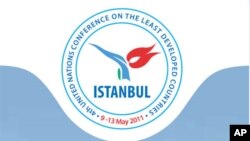A new report recommending ways to boost Africa’s standard of living was released Tuesday at the Fourth U.N. Conference on the Least Developed Countries in Istanbul, Turkey.
“Integrated regional investments could lead to an accumulated 10 percent increase in the continent’s standard of living between 2012 and 2020,” said report from the U.N. Development Program (UNDP).
Infrastructure deficit
UNDP Administrator Helen Clarke was in Istanbul for the release of Regional Integration and Human Development: a Pathway to Africa.
“This report says that it would be good for Least Developed Countries [LCDs] and for Africa generally if there were greater regional integration. Now to make that hum, you need more trans-border infrastructure investment for a start. One of the things that really holds back trade within Africa is the lack of good logistics. Roads aren’t always in good repair, if existent. And rail is very underdeveloped in many countries,” said Clark.
She described the problems as an “infrastructure deficit,” which includes not only transport, but also clean water, power and communications.
Finding the money
Half of Africa’s population, nearly 500 million, lives in 33 LDCs and shares less than one quarter of Africa’s gross domestic product, according to UNDP. So where would investment money come from?
“In many cases there’ll be a big role for the multi-lateral development banks,” Clark said, “but I think there’ll also be private-public partnerships, which enable countries to speed up the development of their infrastructure. There’ll also be a role which some of the major emerging countries are playing in South-South cooperation. And I think there’s a lot of awareness of the role China is now playing in infrastructure projects. So I think there’ll be a wide range of ways to do this.”
Pro-poor policies
The UNDP report said if integrated regional investments are to succeed, they must be “coupled with pro-poor policy.”
“The objective would be to see human development as an outcome of regional integration, not just a byproduct, but something you actively plan for. For that to be the case, you have to be planning around the education and skills you’re going to need to drive greater regional economic integration. It also means a healthy population because unhealthy populations aren’t able to give economic growth much momentum,” she said.
The report also recommended basic social protection.
“When you go to integration, there will be some winners and there will be some losers unless you mitigate. So you need to build that into the design of regional integration, as well,” said Clark.
Where there’s a will
According to the report, “The achievement of greater integration can only become reality if supported by strong political will and committed leadership in African countries.”
Clarke said, “I think increasingly we will see that leadership and will because African countries are aware of what very successful models of regional integration have achieved, for example, in Southeast Asia. I think that Africa knows it has a lot more potential to trade between itself but that’s it’s held back for a variety of reasons, not [the] least these major infrastructural ones.”
She said she sees that commitment within the African Union (AU), the Southern African Development Community (SADC) and the Economic Community of West African States (ECOWAS).
“I guess the objective is to see Least Developed Countries move out of that category and along the development trajectory,” she said.
Turkey, current chair of the LDCs conference, is compiling a list of countries it believes can do that over the next 10 years.
“There are many which could graduate,” said Clark, “There are others currently, like Afghanistan, held back by very, very considerable conflicts. But so often in the conflict-ridden countries we see very, very great resources, as well. So peace and stability have a big part to play in lifting countries out of the development stagnation, if you like, that a number are in.”
She added that investment in smallholder agriculture also plays a crucial role in economic growth. The sector has received more attention following the start of the crisis over soaring food prices and supply shortages several years ago.




